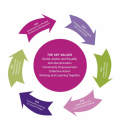 "Community development work is a huge force for good that could, if done well, transform the lives of people ,,,,,, if done poorly community development work can cause serious damage to communities."
"Community development work is a huge force for good that could, if done well, transform the lives of people ,,,,,, if done poorly community development work can cause serious damage to communities."
Following the first publication by The Manchester Community Development Work Practice Group, "The Rise of CDW in Manchester", this blog tells the story of my journey into community development work and some of its key insights.
My journey in community development work started as soon as I left university. I began working, as a volunteer, with Judith Gray, a remarkable and dynamic public health doctor in North Manchester. She was planning a new community mental health service in Clayton and Openshaw and my job was to involve local organisations. Despite being born in Manchester I'd not even heard of either of these places. I was brought up in South Manchester and had never ventured north of the city centre. I had no idea what I was doing, I was one of those keen and eager people who appear briefly in communities on a project of some kind and then usually disappear fairly soon. My main assets were naivety, youth, a willingness to listen and a strong belief in what I was doing. People in Clayton and Openshaw were kind and understanding, on the whole, as I fumbled around.
I started coming across people doing community development work. Probably the most important of these for me was a (Methodist, I think) minister, called Chris Warner, who helped me to see some of the things that I was doing wrong and introduced me to the Greater Manchester Community Development Network (long since gone). I started attending all kinds of conferences and workshops and training events. What I learnt at that time influenced everything I have done since. It opened up a new way of looking at things, a different world view, and a vast range of knowledge and experience that fitted beautifully with what I was trying to do. Rather than looking for simple solutions it embraced and valued the complexity and constructively interacted with it.
I learnt that the critical difference between someone who works in the community and a community development practitioner is "reflective practice". Just as you shouldn't try to be a social worker or a counsellor without high quality supervision you shouldn't try to be a community development work practitioner without proper support. Working with communities is complicated and there are rarely standard answers or set ways to act. There's no formula, or toolkit, or technique that can tell you what to do next. It is always about the time, the context, the history, the story and the people and one's own abilities and personality. Reflection, using a range of methodologies including types of supervision, team work and self-awareness techniques are how a community development worker decides what to do next.
As referred to in the title of the recent publication by the Manchester Community Development Work Practice Group, it seems that community development work is becoming popular again after 20 years or so in the doldrums. It never went away, of course. The aim of the Group is not to create a new cadre of highly paid professional community development workers which then prevent other people from practising. The aim, rather, is to recognise that there is an expertise in community development work and everyone working with communities can build on their experience and become more proficient. For some people, that will mean attending a course at university alongside practical application. For others, like myself, it will be through attending conferences, workshops and training courses and learning from the people you work with.
I hope it is time for another creative resurgence of community development work practice where new people will understand the power of the approach and build on the wealth of past learning.